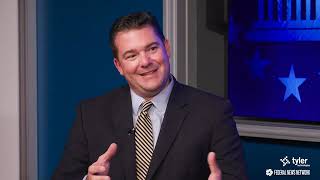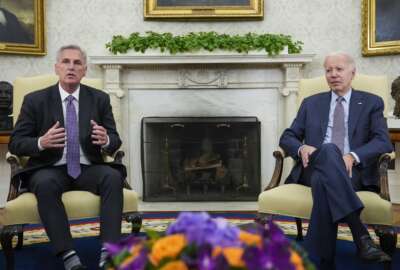
How about evidence-based policy making not just for you, but for Congress?
A bipartisan resolution aims to bring more evidence-based policy making to Congress. It would establish a commission to, in the words of the sponsors, "facilitate...
A bipartisan resolution aims to bring more evidence-based policy making to Congress. It would establish a commission to, in the words of the sponsors, “facilitate the integration of robust data in the legislative process.” For more about what that would do, Federal Drive with Tom Temin talks with one of the main backers of the resolution, Rep. Derek Kilmer (D-Wash.)
Interview Transcript:
Tom Temin And tell us exactly what you envisioned for a commission to establish evidence-based policymaking on the Hill.
Derek Kilmer Let’s just start with the problem statement, and that’s that we got to get government working better for the folks I represent and around the country. And I think there’s an understanding that Congress makes better policy when it uses sound evidence and when it uses data that can inform how we design policy, how we measure their impacts, how we improve outcomes for the American people. And in a nutshell, that’s really the rationale behind this congressional evidence-based policymaking resolution to make government work better and hopefully to restore public trust. This was done a few years back for the executive branch and part of the work of the Select Committee on the Modernization of Congress was looking at evidence-based policymaking specifically within the legislative branch. And one of the recommendations was, hey, we should replicate what happened in the executive branch because the legislative branch, again, will make better policy if it uses evidence and data better.
Tom Temin Well, let me ask you about an example. One of the debt ceiling deal concerns has to do with people should they work or not work or how old should they be when they work? With respect to getting Medicare and Medicaid services, that seems like a prime example of, well, what are the effects of working or not working? What do we know about the population that has served that age group by these programs, that kind of thing?
Derek Kilmer So there are all sorts of examples where if we use evidence, if we use data, Congress as an institution can make better decisions. I’ll give you just one example germane to our offices. Right now there are 435 members of Congress who do casework for their constituents. Right now, there is not a means through which the calls and concerns that we get, whether there be a problem with the VA or the IRS or Social Security, there’s no means through which that information in an anonymized way gets aggregated to identify problems where you might say, like, wow, it turns out a hundred different offices are identifying the same problem within the Veterans Administration. Using data provides us with an avenue for identifying problems, systemic issues that we can then through smart public policy, solve. You mentioned the discussion around the debt ceiling. Thankfully, Medicare and Medicaid aren’t impacted under this proposal. There has been a discussion around SNAP benefits, around food assistance to folks. And we just saw data come out from the Congressional Budget Office saying actually in the net, more people will have access to SNAP based on some of the waivers that were provided for folks like veterans and Americans who are experiencing homelessness. There’s certainly an impact because of the expansion of work requirements for those up to 54 years of age. Right now, it’s up to 49 years of age. So there are folks between 49 and 54 that will be impacted by those work requirements. But there’s also people who are going to benefit: veterans and folks experiencing homelessness and folks directly out of the foster care system who will get food assistance. And that type of data analytics done by the Congressional Budget Office, again, is a great example of how we can inform smart public policy making.
Tom Temin Maybe the most important challenge to an effort like this would be simply the meat where that is for people to accept the fact that sometimes the data might run against the shibboleths that they’ve been clinging to politically. And that goes for both sides.
Derek Kilmer Often what’s wrong in Congress is it’s what we think we know, not necessarily what we know to be true. And there’s a real, I think, opportunity to make decisions that are informed by the best available data and research. And that means frankly, when it comes to what this means for the American people, it means we can more effectively target resources and efforts to where they’re most needed and can have the most impact, whether it’s education or health care or economic development or any other policy area. Using evidence can help us to design policies that really impact and improve people’s lives.
Tom Temin We’re speaking with Democratic Congressman Derek Kilmer, who represents Washington’s sixth District. And you envision a number of things that this commission could in turn consider should Congress agree to create it. And a lot of them are, as you mentioned, having, say, a chief data officer for Congress, some real operational changes that would underpin the ability for members to have the data they need.
Derek Kilmer Well, this is what we saw coming out of the Evidence Act that applied to federal agencies. We’ve seen since the passage of the Evidence Act a pretty remarkable transformation in terms of how federal agencies approach decision making. That law emphasized the necessity of data and evidence and informing policy decisions. And to your point, it gives agencies a mandate to invest in high quality and objective research and to use that research in setting their agendas, to have chief data officers to sort of manage that data. Certainly there are still areas where we can improve. But I think that’s an example of where we’ve made some significant strides in the right direction. And as someone who’s spent the last four years working on trying to figure out how we strengthen Congress and improve Congress as an institution, replicating that and having the legislative branch have access to data, have access to top notch research, and to be able to channel that information into better public policy making, I think is a super example of how the institution can make better decisions for the American people.
Tom Temin Yeah, it sounds like this could really operate on basically the two lenses that Congress often sees the world through. One is constituent services, what’s going on actually in my district and what might rise to the issue of attention. And then the oversight with the ability to really understand what’s happening at a data level, federal agencies and program outcomes.
Derek Kilmer 100%. So this is an area that historically and certainly for the last several years, Congress has too often punted to the executive branch. And I’m someone who believes that the people’s house, the founders made under Article one, made the legislative branch, Article one for a reason. The first branch of government. And I think it’s very important that the first branch of government be empowered to make better decisions for our constituents. This, to me, is really a no brainer, and it’s why you’ve seen bipartisan support for this. Democrats and Republicans who have identified this as a real opportunity for the institution to make better decisions, to do a better job of holding agencies accountable. To your point around oversight, to do a better job of making decisions that are grounded in evidence and in data so that we can do a better job of making good decisions for our constituents. So that’s really this proposal in a nutshell, and it’s why you’ve seen such support for it and why you’ve seen all sorts of organizations, whether it be the Bipartisan Policy Center or Results for America or USA Facts or other entities have endorsed this proposal because they think it’s a good idea.
Tom Temin Is there a generational effect to acceptance of this in Congress? Because you’re kind of on the younger side of those members that, see things like this? Some of the old timers, might say, well, why do I need to bother with all this new fangled stuff? We’ve had hearings where members, maybe more in the Senate than in the House, really don’t understand the technologies that are extant and in common use throughout the population already.
Derek Kilmer I think most of my colleagues, whether they be Democrat or Republican, whether they be on the younger side or on the older side, understand that as an institution we need to make good decisions for our constituents. One of the problems we’ve seen over the last really 30 years has been sort of a self lobotomization where a lot of the brains of the institution have eroded, and that has been evidenced by an erosion of oversight capacity. It’s been evidenced by the decline in committee staff, both in real number terms and in terms of being able to have folks with longer tenure who have expertise that we can hang on to. But it also is evidence with regard to the capacity of the institution to use good data to make smart decisions. And I think this is one of those things where this has the capacity to lead to much better decision making. And I think that doesn’t just serve every member of the House of Representatives, it serves every American if this institution can function better and make better decisions.
Tom Temin And what happens next for the resolution? You’ve introduced it just last week, and any chance that it will come to some kind of a vote or an agreement?
Derek Kilmer Well, that’s the plan. The bill was referred to the House Administration Committee. I serve on that committee and I have already flagged it for the committee’s leadership. I think this is the type of thing that could serve as a suspension bill, largely non-controversial, as was the Evidence Act back in 2018, where you saw, Speaker Ryan and Senator Patty Murray lead the charge on that. I had a piece of that bill that I led the charge on. That bill was consequential and thankfully moved pretty smoothly through the Congress.
Copyright © 2025 Federal News Network. All rights reserved. This website is not intended for users located within the European Economic Area.
Tom Temin is host of the Federal Drive and has been providing insight on federal technology and management issues for more than 30 years.
Follow @tteminWFED





